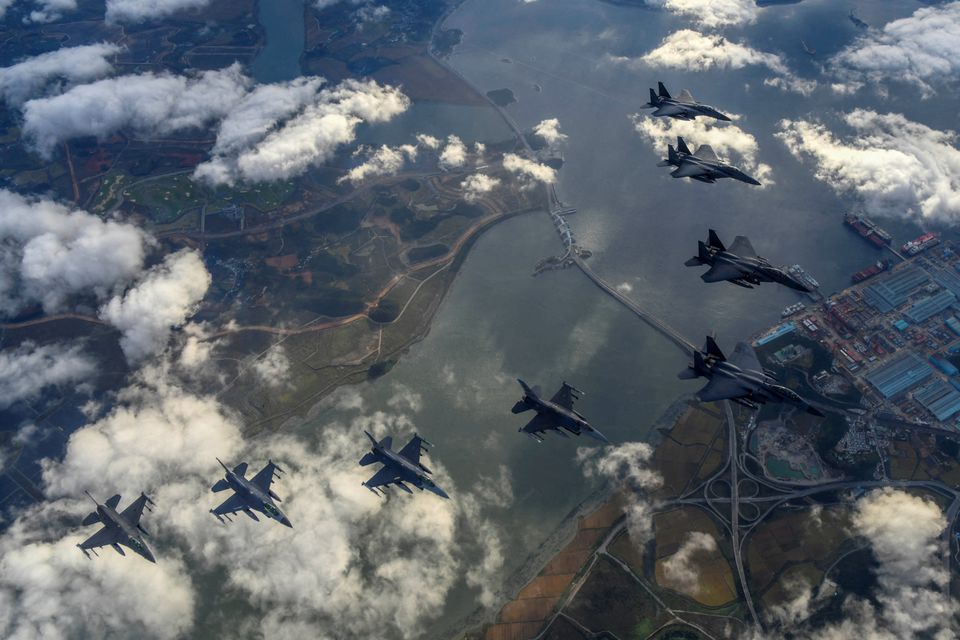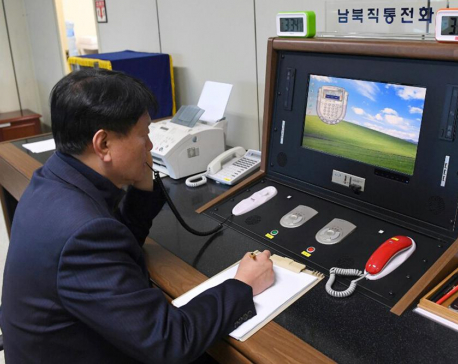
OR
South Korea, U.S. fire missiles into the sea to protest 'reckless' North Korea test
Published On: October 5, 2022 01:15 PM NPT By: Reuters

SEOUL, Oct 5: South Korea and the U.S. military conducted missile drills in response to North Korea's launch of a ballistic missile over Japan, as the United Nations Security Council prepares to meet over what was Pyongyang's longest-range test.
Nuclear-armed North Korea test-fired an intermediate-range ballistic missile (IRBM) farther than ever before on Tuesday, sending it soaring over Japan for the first time in five years and prompting a warning for residents there to take cover.
South Korean and American troops fired a volley of missiles into the sea in response, South Korea's Joint Chiefs of Staff said on Wednesday, and the allies earlier staged a bombing drill with fighter jets in the Yellow Sea. read more
The military separately confirmed that a South Korean Hyunmoo-2 missile failed shortly after launch and crashed during the drill, but that no one was hurt.
South Korea's military said that the missile carried a warhead but that it did not explode, and apologised for causing residents to worry. read more
The White House National Security Council called North Korea's latest test "dangerous and reckless" and the U.S. military and its allies have stepped up displays of force. read more
The USS Ronald Reagan, an American aircraft carrier that made its first stop in South Korea last month for the first time in years, will be deployed between Korea and Japan in what the South Korean military called a "highly unusual" move designed to show the allies' resolve to respond to any threats from North Korea.
U.S. President Joe Biden and Japanese Prime Minister Fumio Kishida condemned North Korea's test in the "strongest terms," the European Union called it a "reckless and deliberately provocative action", and U.N. Secretary-General Antonio Guterres condemned the launch and said it was a violation of Security Council resolutions.
The U.N. Security Council will meet on Wednesday to discuss North Korea at the request of the United States, despite China and Russia telling council counterparts they were opposed to an open meeting of 15-member body. They argued that the council's reaction should be conducive to easing the situation on the Korean Peninsula, diplomats said. read more
It was the first North Korean missile to follow a trajectory over Japan since 2017, and its estimated 4,600 km (2,850 mile) flight was the longest for a North Korean test, which are usually "lofted" into space to avoid flying over neighbouring countries.
Analysts and security officials said it may have been a variant of the Hwasong-12 IRBM, which North Korea unveiled in 2017 as part of what it said was a plan to strike U.S. military bases in Guam.
Neither North Korea's government nor its state media have reported on the launch or disclosed what type of missile was used.
The flight has increased concerns that North Korea may soon conduct an expected nuclear test, which would be the first since 2017.
South Korea's defence minister, Lee Jong-sup, told parliament North Korea had completed preparations for a test and might use a smaller weapon meant for operational use, or a big device with a higher yield than in previous tests.
South Korean President Yoon Suk-yeol called the test "reckless" and said it would bring a decisive response from his country, its allies and the international community.
The launch was a "reckless and deliberately provocative action" that violated U.N. security council resolutions, a European Union spokesperson said. read more
You May Like This

2 Koreas restore hotline despite North’s missile tests
SEOUL, South Korea, Oct 4: North and South Korea restored a stalled communication hotline after weeks of a hiatus in... Read More...

Pro-North Korea daily praises Oscar-winning 'Parasite' for 'exposing' South Korea's reality
A pro-North Korea daily praised Academy Awards best picture-winning South Korean movie ‘Parasite’ on Friday, calling it a masterpiece that... Read More...

Seoul says Kim Jong Un wants Pope Francis to visit N. Korea
SEOUL, Oct 9: North Korean leader Kim Jong Un wants Pope Francis to visit the officially atheist country, South Korea... Read More...





Just In
- 104 houses gutted in fire in Matihani (With Photos)
- By-elections: Silence period starts from today, campaigning prohibited
- A Room of One's Own- Creative Writing Workshop for Queer Youth
- Tattva Farms rejuvenates Nepali kitchens with flavored jaggery
- Evidence-Based Policy Making in Nepal: Challenges and the Way Forward
- Insurers stop settling insurance claims after they fail to get subsidies from government
- Nepal-Qatar Relations: Prioritize promoting interests of Nepali migrant workers
- Health ministry to conduct ‘search and vaccinate’ campaign on May 13













Leave A Comment